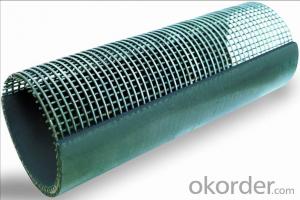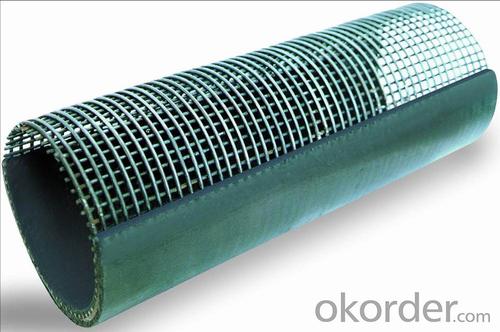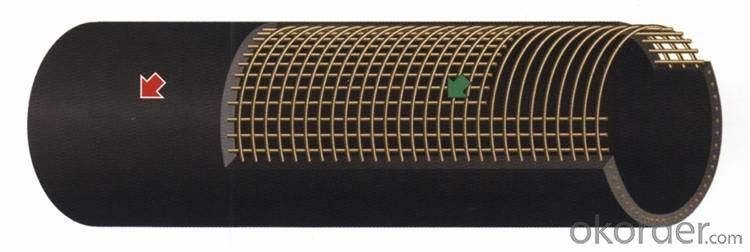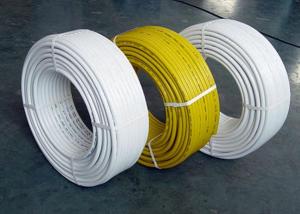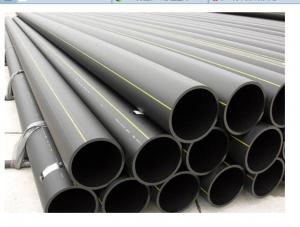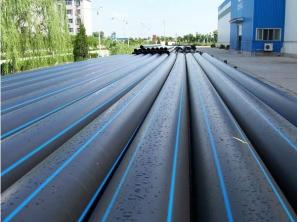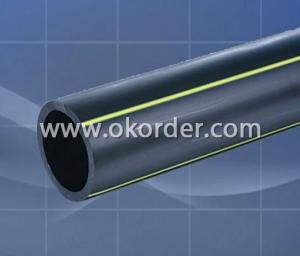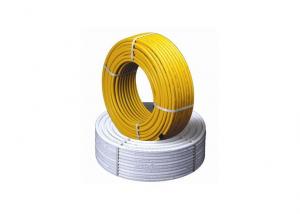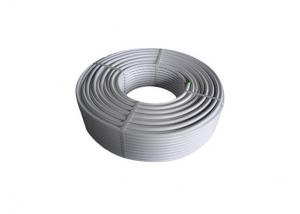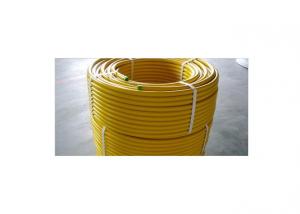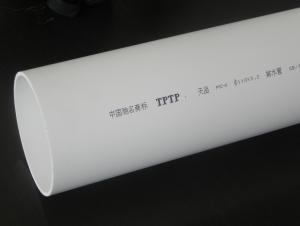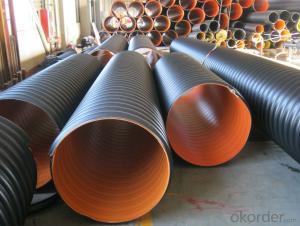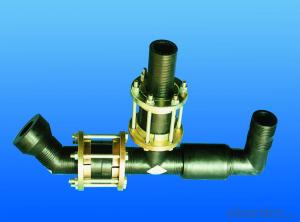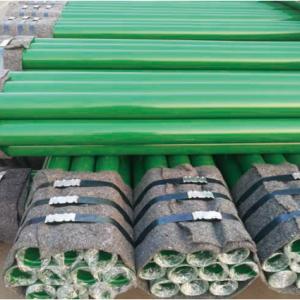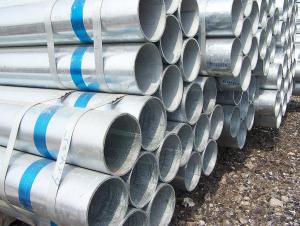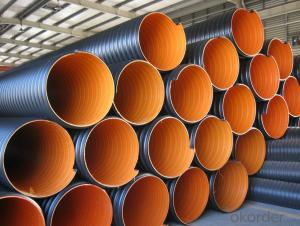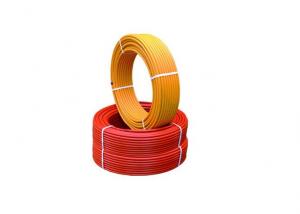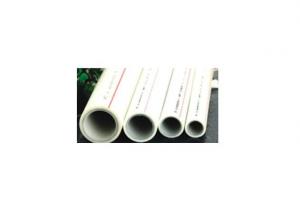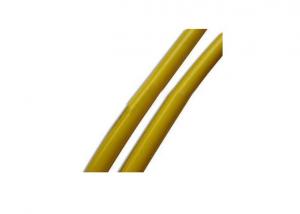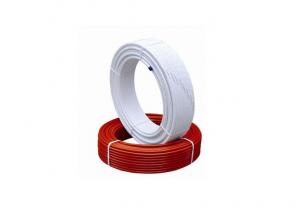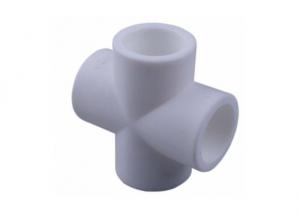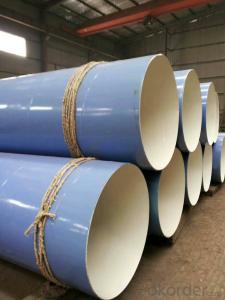steel mesh reinforced plastic pipe
OKorder Service Pledge
OKorder Financial Service
You Might Also Like
Structure
The Steel Reinforced PE Pipe is a new kind of high density polyethylene pipe which is reinforced by a steel wire skeleton. Crossing steel wire are spots welded as a net-cylinder structure during the manufacturing process. HDPE , the stuffing material of the structure ,is continuously extruded on producing line. The structure is similar to reinforced concrete structure.
This combination makes the pipe far stronger than standard HDPE pipe and more flexible and corrosion-resistant than steel pipe. Many of its inherent characteristics are far superior to those of HDPE or steel pipe.
Material
The stuffing material of the steel mesh reinforced HDPE pipe and fittings is PE 80 (piping class), and the high quality low-carbon steel wire is used as the reinforced part of the pipes and Q235 steel sheet is used for the fittings.
Characteristics of PE 80(piping class) material
Characteristics Test Standard Unit Result
Melt Flow Index(5Kg,190℃) | ASTM D 1238 | G/10min | 0.56 |
Density | ASTM D 792 | G/cm3 | 0.954 |
Tensile Yield Strength | ASTM D 638 | Kg/cm2 | 230 |
Tensile Fracture Strength | ASTM D 638 | Kg/cm2 | 370 |
Tensile&Elongation Ratio | ASTM D 638 | % | ≥600 |
Brittleness Tempreature | ASTM D 746 | ℃ | ≤-70 |
Linear Expansion Coefficient | DIN 53752 | K-1 | 1.3x10-4 |
ESCR (F50) | ASTM D 1689 | HR | >2000 |
Thermal Stability | ISO 10837 | min | >20 |
Grade | ASTM D 4131(B) | | PE 80 |
Long-term Hydro Static Strength | ISO 9080 | MPa | 9.33 |
Short-term Hydro Static Strength | ASTM D 4131 | HR | >165 |
The characteristic of steel wire and sheet
Characteristics | Test Standard | Unit | Result | |
Steel wire | ||||
Tensile strength | GB/T 343-1994 | MPa | 400-500 | |
Tensile&Elongation Ratio | GB/T 343-1994 | % | 12 | |
Steel sheet | ||||
Tensile strength | GB/T 709-1988 | MPa | 200 | |
Tensile&Elongation Ratio | GB/T 709-1988 | % | 10 | |
Characteristics
a. Excellent corrosion resistance
Generally acknowledged as the anti-corrosion material, PE has an excellent property that can resist nearly 275 kinds of corrosive medium, such as non-oxidizing acid, alkali and saline solutions.
b.Super hydraulic performance
The absolute roughness of the steel mesh reinforced PE pipe is 0.01mm only while that of the steel pipe is 0.2mm. So the flow resistance is smaller and the conveying capacity is obviously higher than the normal steel pipe under the same condition.
c.Good flexibility and anti-seismic property
The steel mesh reinforced PE pipe has moderate elastic modulus. So it has excellent adaptability to the nonuniform settlement foundation and ground displacement. The good anti-seismic performance will reduce the cost of losses maximally when earthquake occurs.
d.Lighter weight and easier installation
The density of steel mesh reinforced PE pipe is only 40% of that of steel pipe, we don't need the lifting equipment on site when installing pipes of small caliber. Using this kind of pipe can also save bend fittings benefit from the pipe laying according to the topography to the general undulating land. And the requirement of trench digging is less than steel pipe.
e.Super abrasion resistance
Generally, the abrasion property of polyethylene is superior to normal metal material .lt dedicates the abrasion resistance feature of steel framed reinforced PE composite pipe is exactly better than that of the normal steel pipes.
Solid Content | 7 | 14 | 8.8 | |
Wearing Capacity (μm/h) | SR-HDPE | 0.38 | 0.58 | 0.23 |
| | Steel | 1.5 | 2.3 | 0.9 |
f.Excellent heat preservation property
The basic stuffing material of steel mesh reinforced PE pipe is polyethylene. The Thermal conductivity coefficient of PE is 0.43W/m℃,and that of the steel pipe is 2.5 W/m℃. So the heat preservation property is very good. Also we don't need any heat-insulation treatment even installing overhead.
g.Outstanding hygienic character
PE material is nontoxic and is widely used in food industry . The steel mesh reinforced PE pipe use PE as basic stuff ,and it has passed each test of the National Preventive Medical Association and gotten the Healthy Permit for portable water conveying. So our pipe can meet the requirements of Food Hygiene Law and Healthy Evaluation. At the same time, the inner surface of our pipe is bacteria free ,electrochemistry corrosion free and won’t introduce secondary pollution.
h.Working lifetime is longer and comprehensive cost is lower
The features of PE material ensure the working lifeof steel mesh reinforced PE pipe is much longer and comprehensive cost much lower than those of the normal steel pipe in the fields of conveying corrosive medium.
Benefit from the property of anti-corrosion, flexibility and heat preservation, etc., this pipe can be used on the industry of Mining, Oil, Gas, Chemical, the transportation of Ore Pulp and Tailings.
- Q: Do composite pipes require special fittings?
- Yes, composite pipes require special fittings that are specifically designed to be compatible with the unique properties and construction of the composite material used in the pipes. These fittings ensure proper connection, sealing, and structural integrity of the composite pipes.
- Q: What are the water supply plastic pipes and composite pipes?
- PVC-U water supply pipe, steel mesh skeleton plastic composite pipe (fire and water), PPR pipe, PE pipe and so on.
- Q: Do composite pipes have any thermal insulation properties?
- Yes, composite pipes generally have thermal insulation properties. The layered structure of composite pipes, with materials like fiberglass or polyurethane foam, helps in reducing heat transfer and maintaining the temperature of the fluid being transported.
- Q: How high is the temperature resistance of aluminum plastic pipes?
- Hello, under normal working conditions is 95 degrees, its rated working pressure is 1Mpa.The use of aluminum plastic pipe is closely related to the temperature and pressure. I hope I can help my friends!
- Q: Are composite pipes suitable for use in breweries?
- Yes, composite pipes are suitable for use in breweries. Composite pipes are made of different materials, such as fiberglass or carbon fiber, which offer advantages like corrosion resistance, durability, and lightweight construction. These pipes can handle high-pressure environments, temperature variations, and are easy to install, making them a suitable choice for breweries where maintaining the quality and safety of the brewing process is essential.
- Q: Can composite pipes be used for underground cable protection?
- Yes, composite pipes can be used for underground cable protection. Composite pipes are known for their strength, durability, and resistance to corrosion, making them suitable for underground applications. They provide excellent protection against external factors such as moisture, chemicals, and physical damage, ensuring the safety and longevity of underground cables.
- Q: PSP steel plastic composite pipe transition, according to the head can directly melt with PPR
- Within the specified changeover time, the transition joint shall be rapidly inserted into the pipe at the corresponding depth without rotating in the direction of the axis. A certain amount of pressure shall be maintained, the joint shall be pressed, cooled and fixed, and the rotation shall be strictly prohibited.
- Q: Are composite pipes suitable for bridge construction?
- Yes, composite pipes are suitable for bridge construction. Composite materials such as fiberglass-reinforced polymer (FRP) pipes offer several advantages including high strength-to-weight ratio, corrosion resistance, and durability. These pipes can be used in bridge construction to carry water, gas, or other fluids, providing a reliable and long-lasting solution. Additionally, composite pipes can be easily installed and have low maintenance requirements, making them a viable option for bridge infrastructure.
- Q: Are composite pipes suitable for jet fuel transportation?
- Yes, composite pipes are suitable for jet fuel transportation. Composite materials offer high strength-to-weight ratios, excellent corrosion resistance, and low thermal conductivity, making them ideal for transporting jet fuel. Additionally, composite pipes can be designed to meet specific requirements, such as withstanding high-pressure and temperature conditions, ensuring safe and efficient fuel transportation for aircraft.
- Q: Are composite pipes resistant to chlorine degradation?
- Yes, composite pipes are generally resistant to chlorine degradation. The materials used in composite pipes, such as fiberglass and epoxy, have excellent chemical resistance properties, making them highly resistant to the corrosive effects of chlorine.
Send your message to us
steel mesh reinforced plastic pipe
OKorder Service Pledge
OKorder Financial Service
Similar products
Hot products
Hot Searches
Related keywords
